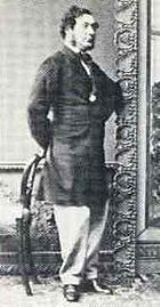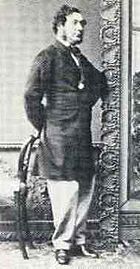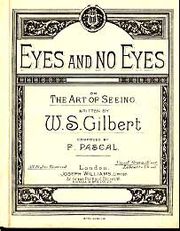
Thomas German Reed
Encyclopedia

England
England is a country that is part of the United Kingdom. It shares land borders with Scotland to the north and Wales to the west; the Irish Sea is to the north west, the Celtic Sea to the south west, with the North Sea to the east and the English Channel to the south separating it from continental...
composer and theatrical manager best known for creating the German Reed Entertainment
German Reed Entertainment
German Reed Entertainment was founded in 1855 and operated by Thomas German Reed together with his wife, Priscilla Reed née Horton...
s, a genre of musical plays that made theatre-going respectable at a time when the stage was considered disreputable. He was married to Priscilla Horton
Priscilla Horton
Priscilla Horton, later Priscilla German Reed , was a popular English singer and actress, known for her role as Ariel in W. C. Macready's production of The Tempest in 1838 and "fairy" burlesques at Covent Garden Theatre. Later, she was known, along with her husband, Thomas German Reed, for...
, a noted singer, actress and dancer, who was his partner in creating the entertainments.
Life and career
German Reed was born in BristolBristol
Bristol is a city, unitary authority area and ceremonial county in South West England, with an estimated population of 433,100 for the unitary authority in 2009, and a surrounding Larger Urban Zone with an estimated 1,070,000 residents in 2007...
. His mother was Frances German, and his father, Thomas Reed, was a conductor. Reed studied music with his father. At the age of ten, German Reed performed on the piano and sang, also singing at the Bath Theatre. He soon appeared in juvenile roles at the Haymarket Theatre
Haymarket Theatre
The Theatre Royal Haymarket is a West End theatre in the Haymarket in the City of Westminster which dates back to 1720, making it the third-oldest London playhouse still in use...
in London, where the family relocated, as his father became conductor at the Haymarket Theatre and later the Garrick Theatre
Garrick Theatre (Leman St)
The Garrick Theatre, also known as Garrick's Subscription was a small theatre located in Leman St, Whitechapel. The theatre opened in 1831, and closed in about 1881...
. In 1832, German Reed became became an organist at the Catholic Chapel on Sloane Street and assistant to his father as conductor of the Garrick Theatre. His work at the theatre included scoring and adapting new operas, including Fra Diavolo in 1837. He also gave private music lessons.

Giovanni Pacini
Giovanni Pacini was an Italian composer, best known for his operas. Pacini was born in Catania, Sicily, the son of the buffo Luigi Pacini, who was to appear in the premieres of many of Giovanni's operas...
's opera Sappho at the Theatre Royal, Drury Lane
Theatre Royal, Drury Lane
The Theatre Royal, Drury Lane is a West End theatre in Covent Garden, in the City of Westminster, a borough of London. The building faces Catherine Street and backs onto Drury Lane. The building standing today is the most recent in a line of four theatres at the same location dating back to 1663,...
. During these years, he met his wife, Priscilla Horton, a successful and popular contralto
Contralto
Contralto is the deepest female classical singing voice, with the lowest tessitura, falling between tenor and mezzo-soprano. It typically ranges between the F below middle C to the second G above middle C , although at the extremes some voices can reach the E below middle C or the second B above...
and actress who had been performing on the stage in London since the age of ten. They married in 1844. In 1851, German Reed was engaged to assist in the production of opera at the Surrey Theatre
Surrey Theatre
The Surrey Theatre began life in 1782 as the Royal Circus and Equestrian Philharmonic Academy, one of the many circuses that provided contemporary London entertainment of both horsemanship and drama...
and later managed Sadler's Wells Opera for a season and also conducted the music at the Olympic Theatre
Olympic Theatre
The Olympic Theatre, sometimes known as the Royal Olympic Theatre, was a 19th-century London theatre, opened in 1806 and located at the junction of Drury Lane, Wych Street, and Newcastle Street. The theatre specialised in comedies throughout much of its existence...
, as well as touring extensively in the British provinces.
In the spring of 1855, at St. Martin's Hall
Queen's Theatre, Long Acre
The Queen's Theatre was established in 1867, as a theatre on the site of St Martin's Hall, a large concert room that opened in 1850. It stood on the corner of Long Acre and Endell Street, with entrances in Wilson Street and Long Acre...
, German Reed and his wife presented the first performance of "Miss P. Horton's Illustrative Gatherings," musical theatre performances usually consisting of one or two brief comic opera
Comic opera
Comic opera denotes a sung dramatic work of a light or comic nature, usually with a happy ending.Forms of comic opera first developed in late 17th-century Italy. By the 1730s, a new operatic genre, opera buffa, emerged as an alternative to opera seria...
s designed for a minimal number of characters and performed with either the piano and harmonium
Harmonium
A harmonium is a free-standing keyboard instrument similar to a reed organ. Sound is produced by air being blown through sets of free reeds, resulting in a sound similar to that of an accordion...
or a small ensemble of musicians. These eventually became "Mr. and Mrs. German Reed's Entertainments", presented at the Royal Gallery of Illustration
Royal Gallery of Illustration
The Royal Gallery of Illustration was a performance venue located at 14 Regent Street near Waterloo Place in London, in what was formerly the home of John Nash, designer of Regent Street, Regent's Park, and other urban improvements undertaken at the commission of George IV.From 1855 to about 1876,...
on Regent Street
Regent Street
Regent Street is one of the major shopping streets in London's West End, well known to tourists and Londoners alike, and famous for its Christmas illuminations...
, beginning in 1856, and later at St. George's Hall
St. George's Hall (London)
St. George's Hall was a theatre located in Langham Place, Regent Street in London, built in 1867, which closed in 1966. The hall could accommodate between 800 and 900 persons, or up to 1,500 persons including the galleries...
. To help lend respectability to their family-friendly entertainments, they called their establishment the "Gallery" of Illustration, rather than a "theatre", and the pieces they produced were called "entertainments," rather than plays, extravaganza
Extravaganza
An extravaganza is a literary or musical work characterized by freedom of style and structure and usually containing elements of burlesque, pantomime, music hall and parody. It sometimes also has elements of cabaret, circus, revue, variety, vaudeville and mime...
s, or burlesques. Reed himself composed the music for many of these pieces, and he often appeared in them along with his wife.
 German Reed became the lessee of St. George's Hall, beginning in 1867, and there he initially produced and conducted The Contrabandista
German Reed became the lessee of St. George's Hall, beginning in 1867, and there he initially produced and conducted The ContrabandistaThe Contrabandista
The Contrabandista, or The Law of the Ladrones, is a two-act comic opera by Arthur Sullivan and F. C. Burnand. It premiered at St. George's Hall, in London, on 18 December 1867 under the management of Thomas German Reed, for a run of 72 performances. There were brief revivals in Manchester in 1874...
by Arthur Sullivan
Arthur Sullivan
Sir Arthur Seymour Sullivan MVO was an English composer of Irish and Italian ancestry. He is best known for his series of 14 operatic collaborations with the dramatist W. S. Gilbert, including such enduring works as H.M.S. Pinafore, The Pirates of Penzance and The Mikado...
and F. C. Burnand, The Beggar's Opera
The Beggar's Opera
The Beggar's Opera is a ballad opera in three acts written in 1728 by John Gay with music arranged by Johann Christoph Pepusch. It is one of the watershed plays in Augustan drama and is the only example of the once thriving genre of satirical ballad opera to remain popular today...
and other English operas in small-scale productions, as well as non-musical plays. When the lease on the Gallery of Illustration terminated in 1873, the German Reed entertainments moved to St. George's Hall. German Reed retired from the stage in 1871, and his son Alfred (1847–1895) took over the entertainments with his mother, continuing with the entertainments after her retirement in 1879, until 1895.
German Reed died at St. Croix, Upper East Sheen, Surrey
Surrey
Surrey is a county in the South East of England and is one of the Home Counties. The county borders Greater London, Kent, East Sussex, West Sussex, Hampshire and Berkshire. The historic county town is Guildford. Surrey County Council sits at Kingston upon Thames, although this has been part of...
at the age of 70. He was buried in Mortlake cemetery.
Works composed by German Reed
- The Drama at Home, or An Evening with Puff (1844)
- A Match for the King (1844)
- The Golden Fleece, or Jason in Colchis and Medea in Corinth (1845)
- Who's the Composer? (1845)
- The Wonderful Water Cure (1846)
- No CardsNo CardsNo Cards is a "musical piece in one act" for four characters, written by W. S. Gilbert, with music composed and arranged by Thomas German Reed. It was first produced at the Royal Gallery of Illustration, Lower Regent Street, London, under the management of German Reed, opening on 29 March 1869 and...
(1869, libretto by W. S. Gilbert) - Our Island HomeOur Island HomeOur Island Home is a one-act musical entertainment with a libretto by W. S. Gilbert and music by Thomas German Reed that premiered on June 20, 1870 at the Royal Gallery of Illustration...
(1870, libretto by W. S. Gilbert) - A Sensation NovelA Sensation NovelA Sensation Novel is a comic musical play in three acts written by librettist W. S. Gilbert and composer Thomas German Reed. It was first performed on 31 January 1871 at the Royal Gallery of Illustration...
(1871, libretto by W. S. Gilbert) - Mildred's Well, a Romance of the Middle Ages (1873)
- He's Coming (Via Slumborough, Snoozleton & Snoreham) (1874)
- The Three Tenants (1874)
- The Ancient Britons (1875)
- Eyes and No EyesEyes and No EyesEyes and No Eyes, or The Art of Seeing is a one-act musical entertainment with a libretto by W. S. Gilbert and music originally by Thomas German Reed that premiered on July 5, 1875 at St. George's Hall in London and ran for only a month. The original music was lost, and twenty years later new...
; or, The Art of Seeing (1875, libretto by W. S. Gilbert) - Enchantment (libretto by Arthur Law0
- A Spanish Bond (1875)
- An Indian Puzzle (1876)
- The Wicked Duke (1876)
- Matched and Mated (1876)
- A Night's Surprise (1877)
- No. 204 (1877, libretto by F. C. Burnand)

